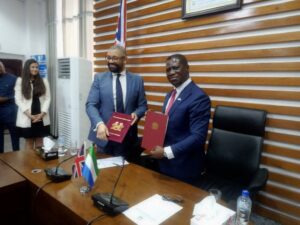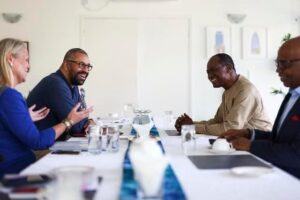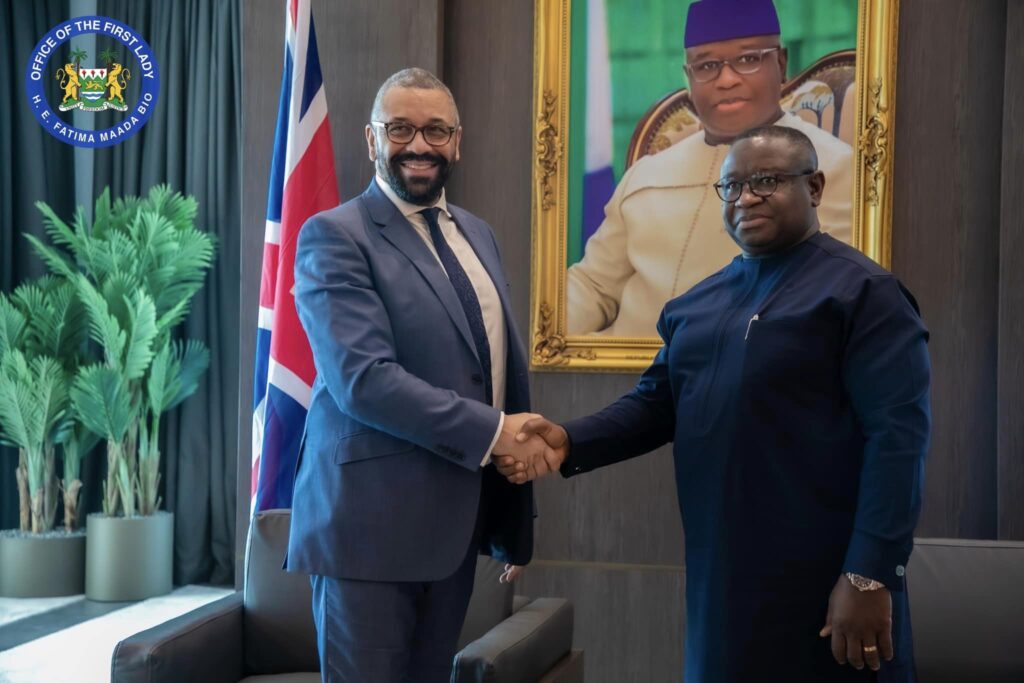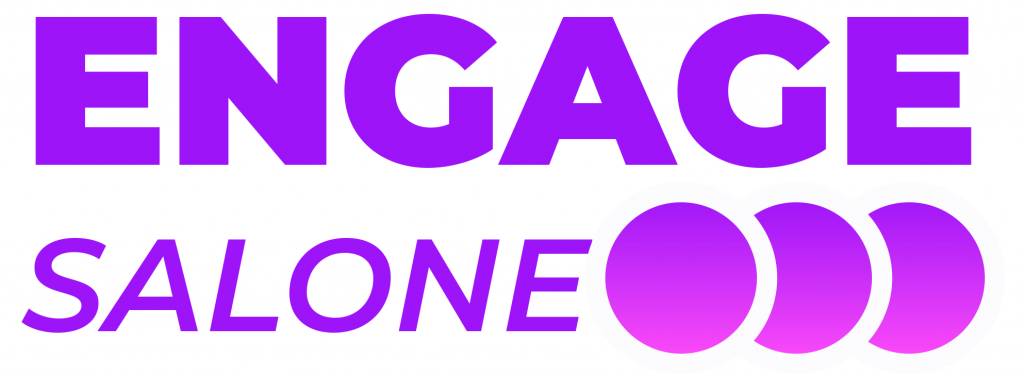As the elections draw closer, some patterns are emerging, and they are all too familiar. There are plenty of glossy and ubiquitous billboards of the incumbent all over the place. That is one way to tell that the elections are here and it also shows you who controls The Power and resources. But this is not about billboards. Well, at least for now. It is about a trend that is becoming familiar—the finger-pointing and allegations of meddling against Western diplomats. Let us be frank, this is becoming a go-to weapon for an insecure ruling party and their proxies. These attacks are a political gimmick, shrouded in pseudo-nationalism that uses outrage to intimidate and silence diplomats. We will explain why.
In recent weeks, some politicians have had a go at Western diplomats for what they consider or want to make us believe is interference in political and judicial matters. A few tweets by Western diplomats around the period when a high court issued an injunction on the delegates conference of the main opposition All Peoples Congress (APC) got politician and newspaper publisher Sylvia Blyden Tweeting and Facebooking. She suggested that the judiciary was under some sort of pressure from Western diplomats. Another politician and Member of Parliament, Emerson Lamina spent a huge amount of his speaking time at a gathering of legislators in Brussels to directly attack the Ambassador of the European Union along the same lines. And during the visit of the UK Foreign Secretary to Sierra Leone, Sylvia Blyden used the question-and-answer session at a press conference to attack and discredit the British High Commissioner in front of her boss.
It is not our place to speak for the diplomats. In fact, they have done so for themselves. The Honourable Emerson Lamina received a detailed response from the EU delegation in Sierra Leone, debunking his allegations, while Sylvia Blyden met a Foreign Secretary that stood firmly by his High Commissioner and unequivocally endorsed all the work she has been doing, including those that Ms. Blyden took issue with. In both cases, the substantive issues were overshadowed by petty fights. Does anyone remember what the Honourable Lamina was doing in Brussels? The attack on the EU became the highlight of his trip which he certainly did not pay for himself. Sylvia Blyden’s Geneva Convention question and attack on the British High Commissioner, which some people say was all about the outgoing Mayor of Freetown, Yvonne Aki-Sawyer, became the highlight of the press conference. Well, you would guess that that worked. No one was talking about the trade deal between Sierra Leone and the United Kingdom or even the UK’s new strategy on women and girls which was launched in Bo.

What is funny about all these allegations of interference is that they are repeating themselves—coming back in a cycle and in an interesting manner. During and around the 2018 elections, people associated with the ruling party took the same route, attacking whoever they could in the diplomatic community, especially the British High Commissioner. Around the 2012 elections, proxies and officials of the ruling party went on an onslaught against a United Nations representative, Michael Schulenburg. The party in power usually does not say anything to either reassure or disapprove. The Chief Justice exceptionally refuted Sylvia Blyden’s claims that they were under pressure from Western diplomats. Government is generally quiet about these wranglings, and that offers a lot of clues as to who is doing what and for whom. Mohamed Bangura who led the attack on Mr. Schulenburg later proved himself to be an APC proxy and came out. Remember the guy who was dancing away on the streets of New York? In what is now also familiar, Mr. Bangura used official Sierra Leonean platforms in his crusade, just like Honourable Lamina did in Brussels where he was supposed to be representing the people of Sierra Leone. Enough of these highlights and let us unpack some of the issues around this game that is being played in every election.
The politicians know that it is easy to attack the diplomatic community. Western diplomats are usually a hard target for the Government of a poor country like Sierra Leone that depends on donations and aid. This is probably why the Ministry of Foreign Affairs never takes a stance on these issues. They would rather watch it play out and smile. Therefore, the seemingly (but not quite) smart thing to do is to let proxies do their bidding or not dissociate themselves from these attacks at all. And with time, you see where the loyalty of the “nationalists” who take on Western diplomats sits—the people or their small, greedy political projects? By the way, Mohamed Bangura was rewarded very handsomely—probably beyond his expectation. And so did the others.
This is not to say that the diplomats in question are saints. They are here to seek and promote the interest of their states before anything else. And if the host nation does not like their behaviour, they should be bold enough to say it and have an honest conversation about it. Wouldn’t that be exciting? When people associated with or can be linked to, the ruling party start harassing diplomats and stoking nationalist sentiments during elections, you begin to suspect a serious popularity deficit and insecurity somewhere. In other words, “the process” does not seem to have trust and confidence in itself.
Everyone is free to opine on and question the behaviour of diplomats in their country. In fact, the sentiments of the people matter a lot in these relationships. Our leaders should know that politics is local. While the role of the international community is important to our development aspirations, the voter is much more concerned about the cost of living than a tweet or statement of support if these do not translate into meaningful change in their lives.
What is also true is that the way these behaviours are appreciated depends on where you sit and how you see things. For the voters in a far-flung rural constituency that had electoral violence unleashed on them and then staring at them again, the involvement of the European Union in observing a by-election that was finally peaceful and largely credible was reassuring. When your own state fails or turns against you, you begin to look outside. The Honourable Emerson Lamina may not like it and yes, it is disappointing that the locals show such a level of trust in representatives of powerful countries and not in their own state and authorities. We should ask ourselves what is the matter, really?
And for people who do not trust the State and its institutions to run free and fair elections on a level playing field, the presence and involvement of international observers and the diplomatic community is a source of reassurance. Many people, especially those in the opposition would hope that at some point, diplomacy can be used to improve the political and electoral environment and diplomacy can again be used to get institutions to do the right thing. If people trusted the State to do the right thing, we would not be having other countries’ fingers in our soup. If a country like the UK says promoting women in leadership and equality generally is a priority for them, then they may go on to like a tweet that announces a woman’s bid for Mayor of Freetown. Did they misjudge the political context? Probably. Would it cause a storm? Well, it did. How do they deal with it, going forward? It will be interesting to see. Can we as a country determine these things? Maybe in another life when we are serious, rich and powerful.
We can see the folly in the actions of our leaders and the display of political immaturity when they are content with a photo-op with a high level Western official but are jittery when the same is accorded to the opposition. They go cap in hand begging for development assistance but are quick to attack when questioned about their stewardship.

It does not seem like these allegations will end anytime soon. In fact, they might increase as the vote draws closer. And Sylvia Blyden is still on the matter. How the diplomatic community deals with this is also going to be important because silence in the face of wrongdoing will be a betrayal from the perspective of those who look up to them. And soldiering on could have implications for the relationship between the State and some Western ambassadors after the elections and depending on who wins. What all of this also reminds the nation is the need for trust between state and society and the even more urgent need to develop your country so that you relate with other States on more dignifying terms that enable the Government to speak for themselves and disown proxies.
Whatever you are up to this weekend, find some popcorn because we seem to be in for a long haul. We will be here to share our thoughts with you, and you can share yours too in the comments or in a proper piece.
About The Author
- Engage Salonehttps://www.engagesalone.org/author/eng21_admin/
- Engage Salonehttps://www.engagesalone.org/author/eng21_admin/
- Engage Salonehttps://www.engagesalone.org/author/eng21_admin/
- Engage Salonehttps://www.engagesalone.org/author/eng21_admin/


